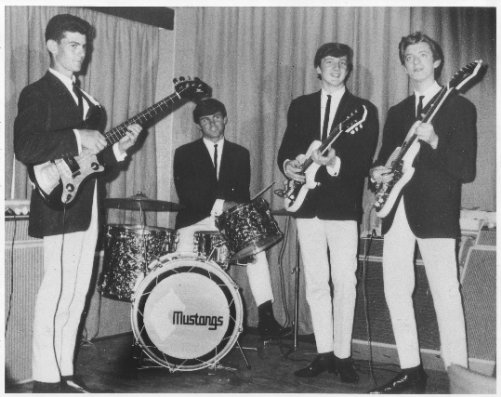 |
 |
|
|
History Of The Mustangs |
In 1961, Lindsay Cook and Robert Hamilton, school mates at Ringwood High School formed a band called “The Savages”. The original members were :
Lindsay Cook, Guitar & Vocals
Robert Hamilton, Guitar & Vocals
Dave Newell, Drums
and various bass players.
As bass players were hard to find Lindsay soon coaxed Robert into
playing bass and they approached Mike Beaver, who
lived in the same street as Robert, and asked if he would consider joining the
band as rhythm guitarist. Mike agreed and Dave Newell was later replaced by Brian Corr. The
band started out playing dances around the Bayswater, Boronia and Ringwood areas
where the boys lived. Then, they began hiring the Bayswater Public Hall and
running their own dances with considerable success. The income was used to
purchase new equipment. Pretty soon they were joined by The Wanderers, who had
been the main opposition for “The Savages” until
they joined forces to make the Bayswater Dance the main
attraction for the local teens who could dance without the supervision of youth
club and church leaders who often ran the local dances in those days.
Several popular local vocalists were also featured at the dances. Hans Tunstall. who won
a talent quest run by the boys became a regular with the band whilst Colin Marshall featured
with The Wanderers. Another local lad from Boronia,
who enjoyed considerable popularity due his ability to emulate the immensely
popular Johnny O'Keefe was Stuart Fyffe, who
took over as lead singer with the band following the departure of Hans Tunstall at
the end of '63.
Pretty soon, the group was attracting the interest of local agents
and promoters and they began working at venues not so close to home, such as Malvern Town Hall, Preston Circle and
other popular dances around the suburbs. The boys also appeared at the popular Festival Hall Sunday
afternoon concerts.
The band soon changed its name to “The Mustangs” and
accepted the offer of sole management from Ron MacPherson. Peter Morrell took
over from Robert Hamilton on bass. A short time later, in late 1964 they became
the house band, working four nights a week at The Peppermint Lounge in Box
Hill, a coffee lounge serving nothing but coffee and toasted sandwiches
and located on the second floor above a sewing machine shop. The
Peppermint Lounge became the most popular venue in the eastern suburbs with
heavy radio advertising. "The Mustangs" backed
such top artists of the time as Colin Cook, Merv Benton, Bobby Cookson, Pat Carroll, Normie Rowe, Laurie Allen & Bobby
Bright, Johnny Cooper, Johnny Lisle, Dave Howard and many
others.
During their time at The Peppermint Lounge the boys lost the services
of their drummer, Brian Corr, for several months when he damaged his wrist
playing football. Danny Finley filled
in for Brian and shortly after formed the popular MPD Ltd made up
of Danny, Pete Watson (ex-Phantoms) and Mike Brady later of
“Up
There Cazaly” fame. Danny went on to become the leading agent
for VFL footballers and coaches.
Whilst working at The Peppermint Lounge, Lindsay met an up and coming
young vocalist named Lyn Baxter, who
became a regular performer at the venue. The band also backed Lyn at other
venues as well as several major dances and it wasn’t long before Lyn and Lindsay
became an item. Lyn worked at many venues, including the popular Springvale Town Hall on a
regular basis until the pair married and Lyn devoted herself to the upbringing
of their three children. It wasn’t until the mid-eighties that she came out of
retirement to become a member of Lindsay’s band “Concept”, which
worked regularly at restaurants and reception centres around Melbourne.
Another performer who started his career at The Peppermint Lounge was El Gamble, who won
a Sunday night talent quest at the Lounge and later went on to join
popular Melbourne band, Ramrod, before
forming the El Gamble Showband, a
highly successful group that performed at major venues right across the
country. El has become regarded as one of the best Elvis Presley impersonators,
a labour of love and tribute to his original hero.
Unfortunately, The Peppermint Lounge did not enjoy a particularly long
life. The high cost of radio promotion, combined with the ambitious strategy of
making it a showplace for the top performers of the time forced the closure of
the popular venue.
"The Mustangs" continued however, and worked at various gigs and some of the new venues that began springing up around the suburbs at that time. Hugh Sutton, an ex-member of Peter Doyle's band joined the group as lead vocalist and bass player. "The Mustangs" finally split up in 1966 and ultimately reformed in 2006 to become "The Original Mustangs"

"The Mustangs" at The Peppermint Lounge in 1964
